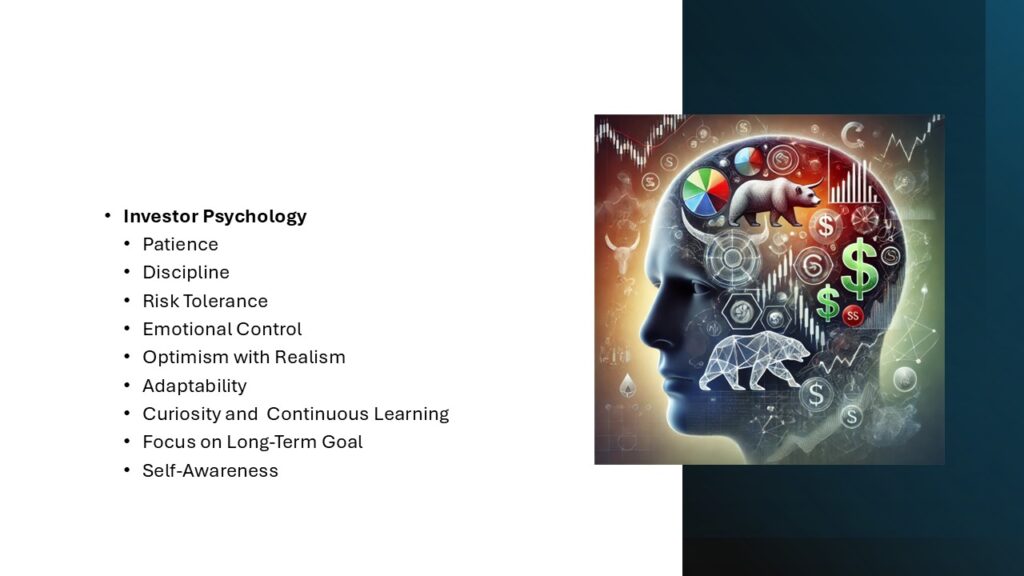Introduction
Investing can be tricky, especially when emotions get in the way. Understanding investor psychology is key to making better decisions. Often, our emotions—like fear and greed—drive our choices, leading to mistakes. By mastering investor psychology, you can learn to manage these emotions, avoid common pitfalls, and make more informed decisions. In this essay, we’ll explore how understanding your own psychology can lead to smarter investing and long-term success.
Understanding Investor Psychology
Investor psychology is all about how our thoughts and emotions influence investment decisions. It’s easy to let feelings like fear or excitement drive our choices, but this can lead to mistakes. Common psychological biases, such as overconfidence or following the crowd, often cloud our judgment. For example, during a market boom, people might invest impulsively, thinking prices will keep rising. By recognizing these biases and understanding how they work, you can make more rational decisions and avoid the traps that many investors fall into.
Psychological Traits of Investors:

Being a successful investor isn’t just about knowing the markets; it’s also about having the right mindset. Patience is key. It allows your investments time to grow without rushing to make quick decisions when the market changes. Discipline helps you stick to your plan, even when things get tough. It’s also important to understand how much risk you can handle. This way, you won’t panic when prices drop.
Controlling your emotions, like fear and greed, is essential so you don’t make hasty choices. You need to stay optimistic about the future but also realistic about what you can expect. Being adaptable is important too. Markets are always changing, and you need to learn and adjust as you go. Focus on your long-term goals, like saving for college or buying a house. Avoid getting caught up in daily market movements. Understanding yourself—your strengths, weaknesses, and biases—helps you make smarter decisions. Finally, having confidence in your choices, while staying open to learning, can make all the difference in your investing journey.
Controlling Emotion: A Crucial Element of Investor Psychology
Emotions like fear and greed play a big role in how we invest. Fear can make you sell stocks too early, while greed might push you to buy risky assets. For instance, during the 2008 financial crisis, many investors sold their stocks in a panic, locking in losses instead of waiting for a recovery. On the other hand, during the dot-com bubble, greed drove investors to buy overvalued tech stocks, leading to massive losses when the bubble burst. Learning to control these emotions is crucial for making better investment decisions.
Cognitive Biases and Their Impact
Cognitive biases are mental shortcuts that often lead to poor decisions. One common bias is the confirmation bias, where investors only seek out information that supports their existing beliefs. For example, if you believe a stock will perform well, you might ignore negative news about it. Another bias is the recency bias, where recent events heavily influence your decisions, like selling stocks after a market drop because you expect it to continue falling. By being aware of these biases, you can challenge your assumptions and make more balanced decisions.
Developing a Mindset for Long-term Success
A successful investor needs patience and a long-term perspective. The stock market is full of ups and downs, but those who stay invested over the long term often see the best results. For example, Warren Buffett, one of the most successful investors in the world, emphasizes the importance of thinking long-term and not being swayed by short-term market fluctuations. Developing a mindset focused on long-term goals can help you avoid impulsive decisions and stay on course toward financial success.
Practical Strategies for Better Decision-Making
To make better decisions, it’s important to have a plan and stick to it. One strategy is to set specific financial goals, such as saving for retirement or buying a house, and use them as a guide for your investment choices. Another approach is to diversify your portfolio, spreading your investments across different assets to reduce risk. For example, instead of putting all your money into stocks, you might invest in bonds or real estate as well. By staying disciplined and following a plan, you can make more rational decisions even during volatile markets.
Continuous Learning: A Key Component of Investor Psychology
Investing is a lifelong learning process. The more you know, the better equipped you’ll be to handle the challenges of investing. For instance, reading books like “The Intelligent Investor” by Benjamin Graham can provide valuable insights into long-term investing strategies. Additionally, keeping up with market news and trends helps you stay informed and make better decisions. Learning from your past mistakes and successes is also crucial. By continuously improving your knowledge and skills, you can master investor psychology and become a more successful investor.
Conclusion
Mastering investor psychology is essential for making better investment decisions. By understanding how emotions and cognitive biases affect your choices, developing a long-term mindset, and applying practical strategies, you can navigate the complexities of investing with greater confidence. Continuous learning and self-awareness are key to staying on track and achieving long-term financial success. With the right psychological tools, you can turn market challenges into opportunities and build a solid foundation for your financial future.

